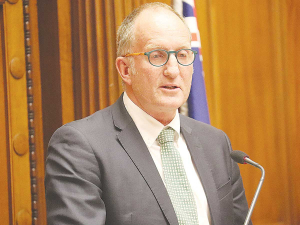Red Meat Exports Deliver $1.4bn in Tariff Savings Across EU, UK and US Quota Markets
Red meat exports to key quota markets enjoyed $1.4 billion in tariff savings in the 2024-25 financial year.
 Andrew Morrison says the board considered they should take personal responsibility for any director renumeration recommendations.
Andrew Morrison says the board considered they should take personal responsibility for any director renumeration recommendations.
Andrew Morrison, New Zealand Meat Board chair, has defended the move by Beef+Lamb NZ (BLNZ) directors to sack an independent committee established to set director remuneration.
BLNZ disestablished the Directors Independent Remuneration Committee (DIRC) late last year. The DIRC was set up in 2016 as an independent body to recommend any changes in director remuneration.
Morrison told Rural News the DIRC was disestablished primarily because both BLNZ and New Zealand Meat Board (NZMB) directors – basically the same people – agreed that the best approach in future was for the boards to actively take ownership of remuneration recommendations.
“The board has to make a final call on this, so we felt the extra layer [the DIRC] was adding complexity to a market-informed process,” he claims. “The recommendations will be accepted or rejected by levy payers as part of the annual meeting process.”
Morrison says the board and the DIRC view or review the same market information to make a decision on director remuneration.
“The board considered that as directors we should take personal responsibility for any recommendations.”
When asked about not having an independent committee such as the DIRC reviewing director fees and how it put BLNZ in an opposite position to many other farmer organisations, Morrison says “different boards have different approaches”.
“The board has decided to receive this information from an independent party directly and then be responsible for making its own decisions.”
Christchurch-based management consultants Mitchell Notley and Associates (MNA) were hired by the BLNZ board to prepare a report on director remuneration.
Morrison refused to reveal how much the MNA report and advice cost BLNZ, saying it was “commercially sensitive”. But he claims it cost “no more” than advice received annually for fees reviews.
Meanwhile, Morrison told Rural News while there was “debate” around the board table about the decision to disestablish the DIRC and increase director fees: “After all considerations, the board all supported the recommendation and agreed that transparency on director commitments is required.”
Nice earner!
It is not only Beef+Lamb NZ directors who are doing well in the pay stakes, with 40% of the organisation’s staff currently earning $100,000 or more a year.
BLNZ’s latest annual report (2020) shows that of its total workforce of 100 full time employees (FTE), 40 earnt at least $100,000 or more in annual salary – the same number as in 2019.
However, there was a big increase in the number of BLNZ’s staff earning $180,000 or more a year – jumping from 6 in 2019 to 14 in 2020.
The top annual salary at BLNZ – expected to be that of chief executive Sam McIvor – is listed in the earning band of between $330,000 and $339,000.
The Meat Industry Association of New Zealand (MIA) today announced that Chief Executive Officer Sirma Karapeeva has resigned from the role.
The winners of the 2026 Hawke’s Bay/Wairarapa Dairy Industry Awards were announced at the annual awards dinner held at Copthorne Solway Park in Masterton on Thursday evening.
Environment Southland is welcoming this week’s decision by the Environmental Protection Authority (EPA) to approve the release of Blaptea elguetai, a leaf‑feeding beetle that will help control the highly invasive Chilean flame creeper.
This March, the potato industry is proudly celebrating International Women’s Day on 8 March alongside the International Year of the Woman Farmer, recognising the vital role women play across every part of the sector — from paddocks and packhouses to research, leadership, and innovation.
Fruit trader Seeka posted a record profit and returns to shareholders in 2025.
Recent weather events in the Bay of Plenty, Gisborne/Tairawhiti, and Canterbury have been declared a medium-scale adverse event.

OPINION: A mate of yours truly reckons rural Manawatu families are the latest to suffer under what he calls the…
OPINION: If old Winston Peters thinks building trade relations with new nations, such as India, isn't a necessary investment in…